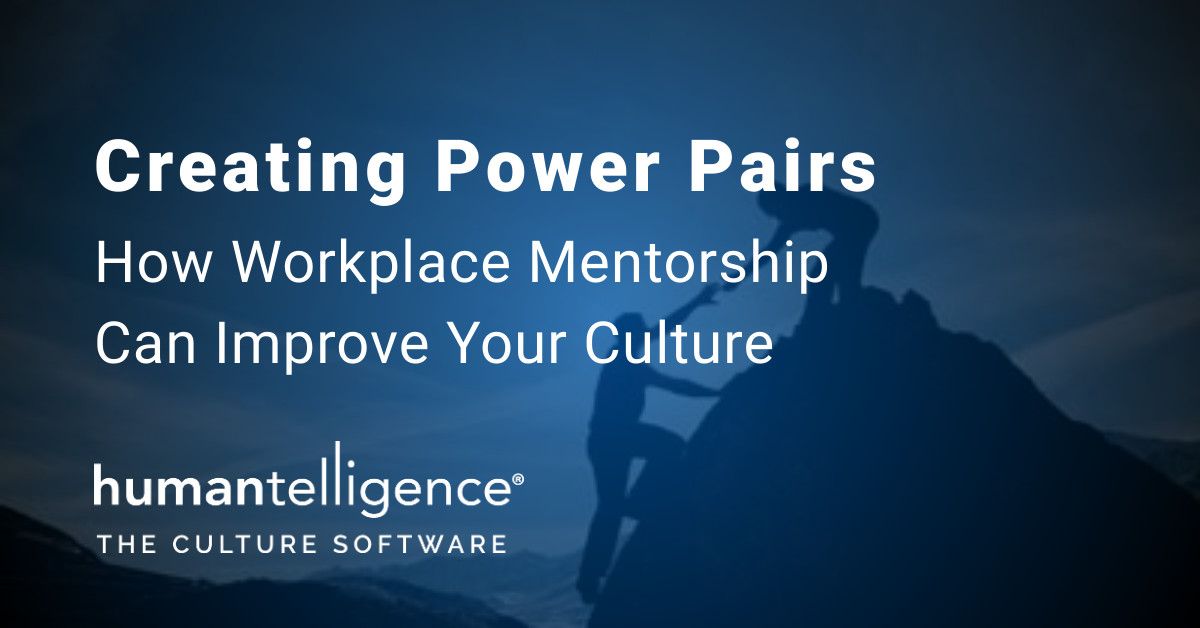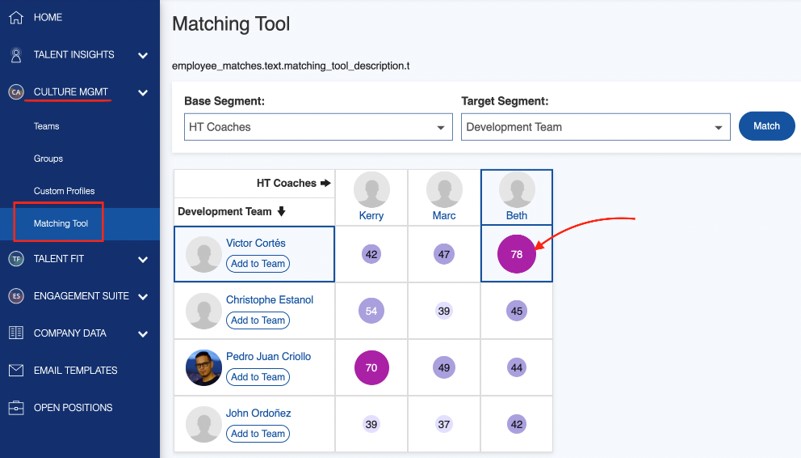Creating Power Pairs: How Workplace Mentorship Improves Culture
- November 15, 2021
- Humantelligence

A mentoring program can improve employee retention, create better diversity of thought, help you plan for the future, and save on other training costs.
Workplace mentoring or coaching is a cost-effective way for existing, well-trained or experienced employees to provide guidance and knowledge to less-experienced employees or to employees who differ from them. The mentor is typically not the direct manager or supervisor of the mentee, and the outcomes differ, depending on the goals of the program.
Serving as an example, the mentor helps the mentee develop new skills, become better problem-solvers, build new ways of interacting and behaving, and get acclimated to the work environment. For the mentor, it is a way to practice leadership and development skills and may help them advance within the organization. It’s also an opportunity for mentors or coaches to learn from those who are different from themselves.
For the company, a mentor/coaching program is also a great way to cost-effectively strengthen employee engagement and reduce turnover. There are five common ways companies use mentorship in the workplace.
Career Mentoring for Improved Employee Career Development
High-Potential Mentoring for Leadership Development
Diversity Mentoring for an Inclusive Workplace
Reverse Mentoring for Efficient Knowledge Sharing
Mentoring Circles for Collaborative Learning
Why mentorship is important
Employee Retention
The mentor experience positively influences job satisfaction among new employees. The addition of a mentor program helps to create a positive work environment, and a higher level of employee satisfaction leads to improved retention.
According to Forbes, retention rates were significantly higher for mentees (72%) and for mentors (69%) than for employees who did not participate (49%) in a mentor program. It’s been proven that it is more costly to acquire new talent than it is to retain employees, and mentorship programs can help reduce these costs.
Diversity
Diversity and inclusion are significant challenges for organizations. Mentoring programs can help promote diversity in leadership by encouraging the sharing of opinions, knowledge, and ideas throughout an organization. A successful mentor program can serve to better attract and retain employees from all different backgrounds and walks of life, while helping current employees become more comfortable with ideas, backgrounds, and experiences other than their own.
Mentor Skill Building
It’s expected that the mentors are improving the skills of the mentees, but what professionals may not realize is that the mentors are also improving their skills through knowledge sharing. For example, employees of differing generations paired together could discuss topics like technological changes or how to efficiently structure one’s workday.
Succession Planning
The addition of a mentorship program can spark greater leadership development, which can help with succession planning for the future. Mentees experience faster progression in their growth and institutional knowledge, and the mentor deepens their sense of purpose and strengthens their leadership position within the organization.
Pairing mentors & mentees
When you first set out to start a mentor program, you will need to decide what your objectives are and how you will measure them, using KPIs like satisfaction scores, learning targets, engagement activity, and retention rate just to name a few. Once you’ve done the hard work of designing the program and onboarding lots of eager participants – the question becomes, how to match them?
The details the participants were required to enter upon sign up – such as background, skills, experience, interests and so on – can be used to match mentees with mentors who can best help them reach their goals.
Most of the time, matching mentees with mentors who can best help them reach their goals is done manually by program organizers, and while they often have great knowledge of the objectives and participants, this manual matching is naturally subject to human bias and blind spots.
And even if you don’t have a formal mentorship program in place just yet, that doesn’t mean you have to wait to start figuring out the best matches. That’s where Culture-as-a-Service (CaaS) software comes into play.
Based on psychometrics, CaaS can give you a multi-dimensional snapshot of a person, rather than just a bulleted list of facts from a resume or accomplishments list. It includes comprehensive data on an employee’s critical behaviors, motivators, and work energizers, as well as sought-after skills like communication, creativity and adaptability. When you assess this kind of emotional intelligence right alongside cognitive abilities, you’ll find yourself removing unconscious biases and engaging in a more inclusive approach to identifying teaching & learning opportunities for your employees.
With a Matching Tool that leverages this kind of data, you can easily perform a many-to-many comparison of employee segments or teams so you can see who might be best to match up. This technology uses a similarity score so you can see who’s most similar or drastically different. By clicking on the similarity score, you then reveal a side-by-side comparison of potential coach/mentor and coachee/mentee.

Most organizations are striving for increased engagement and long-term retention. Those rates tend to increase when the company culture improves, and developing employees through mentorship and coaching as well as learning and growth opportunities play a significant role in creating a healthy, open culture. Mentoring programs are just one of many strategic ways to develop employees and improve retention. We can help you do that.